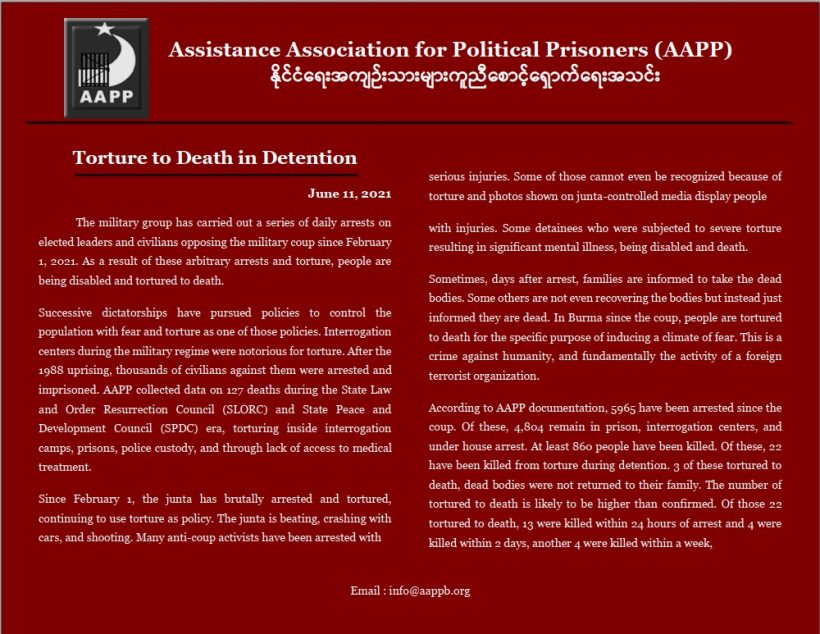Torture to Death in Detention

June 11, 2021
The military group has carried out a series of daily arrests on elected leaders and civilians opposing the military coup since February 1, 2021. As a result of these arbitrary arrests and torture, people are being disabled and tortured to death.
Successive dictatorships have pursued policies to control the population with fear and torture as one of those policies. Interrogation centers during the military regime were notorious for torture. After the 1988 uprising, thousands of civilians against them were arrested and imprisoned. AAPP collected data on 127 deaths during the State Law and Order Resurrection Council (SLORC) and State Peace and Development Council (SPDC) era, torturing inside interrogation camps, prisons, police custody, and through lack of access to medical treatment.
Since February 1, the junta has brutally arrested and tortured, continuing to use torture as policy. The junta is beating, crashing with cars, and shooting. Many anti-coup activists have been arrested with serious injuries. Some of those cannot even be recognized because of torture and photos shown on junta-controlled media display people with injuries. Some detainees who were subjected to severe torture resulting in significant mental illness, being disabled and death.
Sometimes, days after arrest, families are informed to take the dead bodies. Some others are not even recovering the bodies but instead just informed they are dead. In Burma since the coup, people are tortured to death for the specific purpose of inducing a climate of fear. This is a crime against humanity, and fundamentally the activity of a foreign terrorist organization.
According to AAPP documentation, 5965 have been arrested since the coup. Of these, 4,804 remain in prison, interrogation centers, and under house arrest. At least 860 people have been killed. Of these, 22 have been killed from torture during detention. 3 of these tortured to death, dead bodies were not returned to their family. The number of tortured to death is likely to be higher than confirmed.
Of those 22 tortured to death, 13 were killed within 24 hours of arrest and 4 were killed within 2 days, another 4 were killed within a week, and 1 victim was killed within two weeks. Almost all the victims were found with wounds consistent with torture, it can be seen all over the bodies. However, the junta reports they died from illness or other cause.
U Aye Ko, 40-year old, was shot by the junta troops while night guarding in front of Ta Tar Oo Monastery, Mandalay on March 27. They dragged him onto a burning car tire. An eyewitness said that Aye Ko was not dead and could still walk when he was burnt alive.
U Kyaw Kyaw (a.k.a. Agga Moe Nyo) 39-year-old, was arrested on March 15. On March 30 he was announced dead, his family were not allowed to return and bury his body.
Daw Khin Marlar Win (a.k.a. Myo Myo Lwin) 39-year-old, was detained on March 19 in the Pakokku crackdown. She begged on her knees not to be arrested, she was forcibly arrested. The family was informed to take the dead body the next morning.
U Zaw Myat Linn, 46-year-old, was arrested in Shwepyithar Township where he lived. He was killed that night. According to eyewitnesses, his whole head was bruised, and parts of his mouth and body had disintegrated.
The prohibition of torture, and especially to death, is customary and observed across national military manuals. Torture is prohibited in Burma’s domestic law as well, “bodily pain” and “grievous hurt” are outlawed under the Articles 319 and 320 of Burma’s Penal Code. Articles 330 and 331 specifically forbid a public servant to commit “hurt” and “grievous hurt” during interrogations. According to Article 166, any public servant disobeying this law and intentionally harming any person shall be punished to one year imprisonment, a fine or both. When a public servant commits torture to death, it is a crime of murder. The Prisoner Act 49 provisions includes situations concerning the different use of punishment, and the restriction of a prison authority to significantly harm detainees.
According to the international human rights law torture is prohibited under any circumstances:
Article 3 of Universal Declaration of Human Rights
Article 7 of International Covenant on Civil and Political Rights (ICCPR)
The Convention against Torture and Other Cruel, Inhuman or Degrading Treatment or Punishment (commonly known as the United Nations Convention against Torture (UNCAT)
Burma is one of the handful countries to refuse to sign the UN Convention against Torture. The Assistance Association for Political Prisoners (AAPP) strongly condemns such brutal torture and killings. At the same time, we call on the international community to take immediate and effective action in preventing the recurrence of torture.
In Solidarity,
AAPP
Download link for Statement English_Statment_Torture_to_Death_Final
Download link for list Torture & Death by Military coup (Autosaved)

